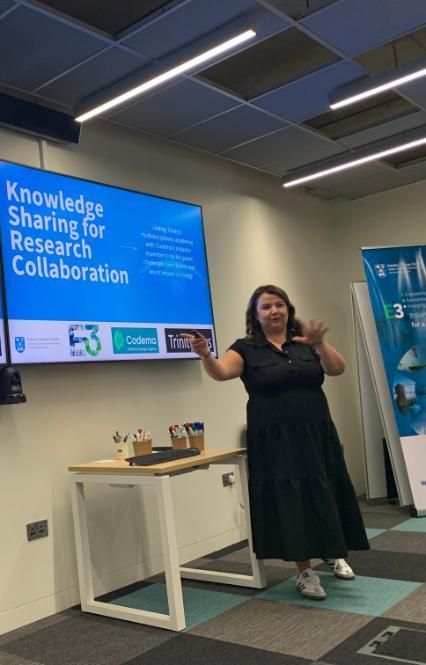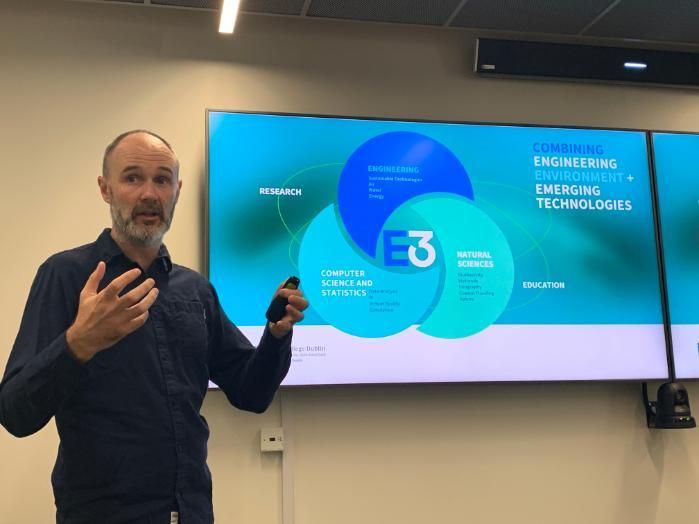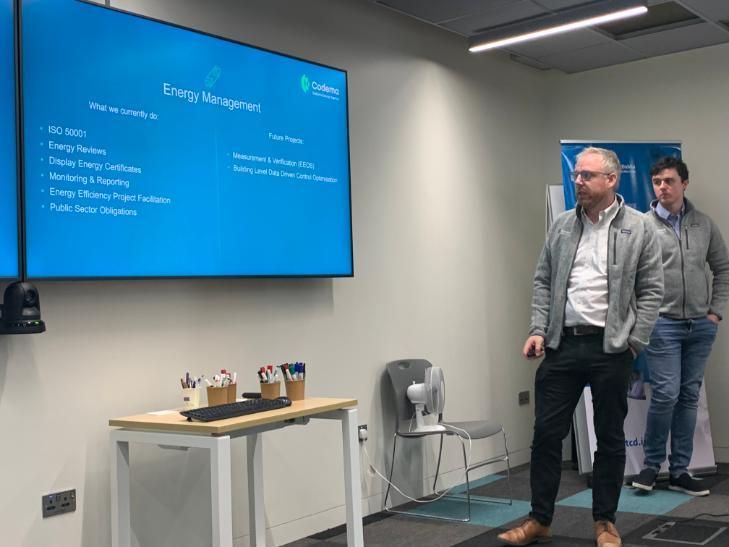Last Friday morning, a unique event took place at Trinity College Dublin, quietly but confidently pushing forward the conversation on Dublin’s energy future. The Codema–Trinity Knowledge-Sharing Event, held on the 31st August 2025, brought together a lively mix of engineers, academics, local authority representatives, and sustainability practitioners, all with a shared goal: to better understand, and respond to, the energy and climate challenges facing Dublin.
Organised by Ruth Clinton (E3 Industry Engagement and Partnerships Manager) and hosted by Dr. John Gallagher (Associate Professor in Environmental Systems Modelling and Director of TrinityHaus), the event served as a space for deep exchange — not only between academia and industry, but also between ideas and action for potential research collaboration.
 Above: E3's Ruth Clinton (Industry & Engagement Manager)
Above: E3's Ruth Clinton (Industry & Engagement Manager)
 Above: Dr. John Gallagher
Above: Dr. John Gallagher
Prof. Triona Lally opened the event by welcoming everyone and highlighting the range of industry engagement opportunities available in Trinity. Continuing from that, Dr. Gallagher highlighted the importance of grounded collaboration, emphasising that it’s often at the intersection of sectors where the most impactful solutions emerge. This tone set the stage for a morning of engaging presentations and valuable discussions.
Codema, Dublin’s Energy Agency, followed with an introduction to its work supporting the four Dublin local authorities. With a strong focus on delivering practical, low-carbon solutions tailored to the city’s unique context, Codema’s message was clear: technical innovation must be matched with local relevance and public engagement.
Highlights from the Morning
One of the key talks came from James Lawson, Energy Systems Engineer at Codema, who delved into the planning and implementation of Decarbonising Zones across the city. These zones, introduced under national policy, are designated areas where low-carbon projects and climate adaptation efforts are concentrated. Lawson shared valuable insights into how these zones are selected, how emissions baselines are developed, and what steps are being taken to bring communities along on the journey.

Above: Codema presenting at the event
Conor Leahy (Executive Manager in Energy Management at Codema) provided insights throughout the workshop into the management of energy data for the Dublin Local Authorities, and Rebecca Cachia (Executive Manager of Energy Planning at Codema) presented on the goals, processes, and findings of master planning of Dublin's energy demand.
Following a break for tea, coffee, and networking, the spotlight turned to Trinity’s researcher, who shared their ongoing research such as Nature and Energy – Adding value to Irelands renewables, Climate Risk, Adaptation & Resilience, Regeneration of Buildings and Community, Monitoring and Modelling building energy, Microgrids, and the importance of Stakeholder Engagement.
The roundtable session that followed was particularly fruitful, as attendees examined the opportunities and barriers to achieving a sustainable energy transition in the region, while also considering the kinds of high-impact, research-driven solutions that could help shape its future. Discussions highlighted the importance of strengthening collaboration between academia and industry, with participants exploring potential project models that could deliver real-world outcomes. The need for a multidisciplinary approach was also strongly emphasised, recognising that only by bringing together a diverse range of expertise can innovative research be translated into maximum impact. Together, these conversations sparked valuable insights and laid the groundwork for future partnerships that can drive both practical progress and long-term transformation.
Beyond the Room
While the event officially wrapped just after 1PM, many conversations continued informally in the Trinity quad and surrounding cafés. One of the more encouraging outcomes was the clear appetite for continued collaboration, not just between Codema and Trinity, but across the broader landscape of public, private, and academic actors working to shape a sustainable Dublin.
The event also served as a springboard for future joint efforts, building on a recent Scope 3 emissions guidance document co-authored by Codema and Trinity’s Sustainability Office. That project, funded by Enterprise Ireland’s Innovation Voucher scheme, laid the groundwork for helping local authorities and SMEs take real steps to measure and reduce their wider emissions.
A Template for What’s Next
Perhaps the most valuable takeaway from the morning was the recognition that while the energy transition is a global issue, its success relies heavily on local action and shared learning. The knowledge-sharing event at Trinity was a timely reminder that Dublin has both the talent and the will to lead, if we continue to work together.
We look forward to seeing how the ideas sparked in that room translate into action in the months ahead.
